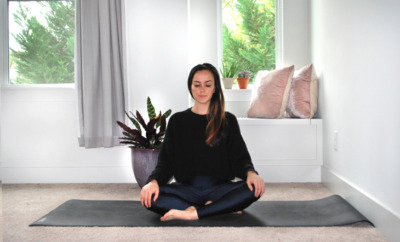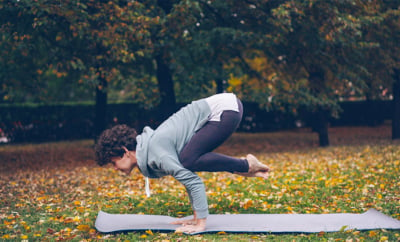7 Habits For Restful Sleep: Do You Do These?

In today’s technologically driven world, many of us find it difficult to unwind and relax into a restful night’s sleep. Smart phones and laptops make getting away from work or social media very challenging, which leaves the mind constantly active. How can we expect our body and mind to easily turn off and rest when it is always on the go?
When it comes to bedtime, many of us find ourselves physically unable to rest, have a mind that won’t stop racing, or we wake up and can’t go back to sleep for hours.
So, how do we prepare our bodies for deep, restful sleep?
How can we expect our body and mind to easily turn off and rest, when it is always on the go?
We can add new habits to our lives that give our mind and body the opportunity to shift gears and rest. Establishing a routine to make sure you’re consistently getting a good night’s rest may take some time to implement, but restful sleep is imperative to your health.
Our body needs rest, and not just to feel good the next day, but to fight off disease and keep our brain functioning optimally. Putting an effort into creating better sleep for yourself will improve your health and wellness, and quality of life overall.
How can we expect our body and mind to easily turn off and rest, when it is always on the go?
To Achieve Better and More Restful Sleep, Try Incorporating These 7 Habits Into Your Daily Life:
1. Limit What You Eat and Drink
Are you a big fan of caffeine? Try to cut back on food and drinks that contain caffeine by mid- to early afternoon to avoid stimulants close to bedtime. If you enjoy a glass of wine with dinner, try not to imbibe too long afterward, since alcohol can majorly disrupt your sleep cycle.
While a full stomach will disturb your sleep, some foods can actually help you fall asleep. If you get the munchies in the late evening, try eating yogurt or a banana, but stay away from fatty foods, heavy spices and chocolate. You can also drink organic herbal tea like chamomile or valerian to help the body relax.
Are you a big coffee drinker and think it may be interfering with your sleep? Check out Why I Stopped Drinking Coffee and 10 Reasons You Should Too
2. Give Yourself Time to Shift Gears
You are trying to prepare your mind and body for rest, and that can take time. Try to get your nighttime obligations done earlier so you have time to get comfortable and relax before immediately needing to go to sleep.
Once you are ready for bed, you will need a routine that tells your body it is time to quiet down. Below are a few ideas to get your body ready for sleep.
Great bedtime routines and tips to get you started:
- Read! Check out 10 Books Every Yogi Should Read
- Consider a Mindful Journaling Practice and Check Out Tips to Get You Started
- Try 6 Simple Steps for Beginning a Meditation Practice
- Do This Restorative Bedtime Yoga Sequence for Better Sleep
- Try some Pranayama
3. Establish a Routine
Establishing a consistent routine is one of the best ways to help your body prepare for rest. Going to bed the same time every night helps establish your internal sleep/wake cycle and will help you fall asleep with more ease. If your schedule doesn’t allow a consistent bedtime, be sure to keep the suggestions from tip #2 in your nightly routine.
4. Set the Mood
Dimming the lights before bedtime will signal to your mind and body that it’s time for sleep. Keeping your room dark while you sleep will help you stay asleep during the night or fall back asleep if you happen to wake.
Invest in blackout curtains or a cute sleep mask to help your body know it is time to rest. If you have an essential oil diffuser in your room, try some lavender before bed.
Electronics = no sleep. If you do find yourself waking up at night, do not turn on your laptop, T.V. or smartphone (in fact these should not even be in your bedroom). The blue light emitted from the screens will suppress melatonin production that helps you get better sleep.
5. Establish Boundaries
If you have pets or children in your family, it’s important to not let them sleep in your bed. I know – those cute little faces are difficult to part with – but they may be keeping you awake more than you realize.
Pets and children do not sleep calmly, so neither will you. They may move, dream or “talk” while sleeping, which may not disturb them but will most certainly disturb you. Everyone having their own space will greatly help in maintaining positive sleep habits.
6. Adjust Your Sleep Position
Choosing a pillow that allows you to maintain a straight spine and neck will help you fall asleep quicker and stay asleep longer. We all need a certain style to fit our body’s natural alignment. Notice if your neck is flexed back or raised too high when sleeping and adjust your pillow accordingly.
You also need to notice your current sleep position. Sleeping on your back keeps your spine in the most neutral position and allows your body to relax. Sleeping on your side if you have back pain will help you get better sleep.
Sleeping on your stomach is the worst option because it keeps your spine in an unnatural curve and places added pressure on your joints.
7. Get Regular Exercise
Studies have shown that those who participate in aerobic exercise (getting the heart pumping) four or more times a week for at least 10 minutes a day have seen improvement in the quality of their sleep. They even feel less sleepy during the day and are able to fall asleep faster at night.
Maintaining an exercise routine is important to your overall health, so find an activity you will enjoy and that will help keep you motivated.
Need some tips to help you stay motivated with your workout? Check out 10 Tips to Motivate You When You Don’t Feel Like Exercising.
Enjoy Restful Sleep With These Sleep Improving Habits
It’s important to note that studies suggest not working out too close to bedtime because the endorphins released during physical fitness may keep you awake longer. This might not be true for everyone, so find what works best for you.
Your bed should be your sanctuary and it should only be associated with sleeping – not working, eating, or even watching TV. Learning to avoid common enemies of sleep and implementing healthy sleep-promoting habits will help you fall asleep and stay asleep, so you can wake up feeling rested and ready to take on the day.


This Month's Letter
From the Editor
Monthly motivation and food for
thought from our founder.


























